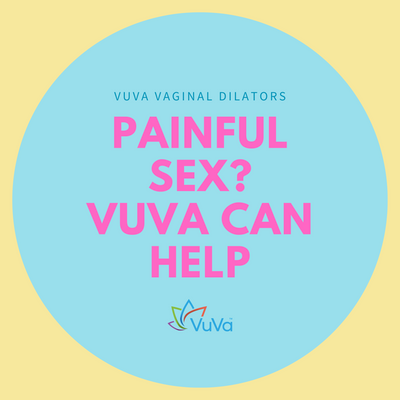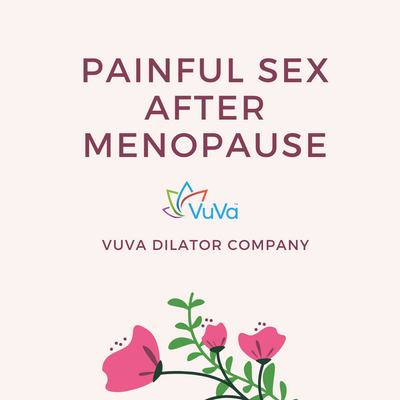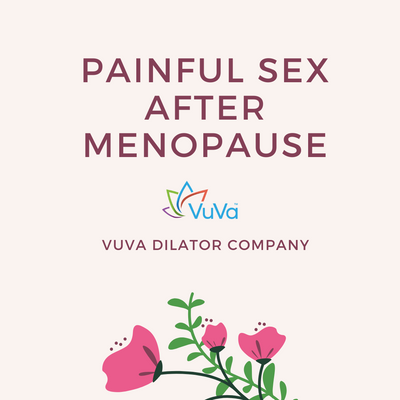
| Tara Langdale
Burning or Stinging During Sex? What It Means and How to Treat It
Sex should be a pleasurable and intimate experience, but for many women, it’s overshadowed by a burning or stinging sensation that can turn intimacy into discomfort or even dread. If you’re searching for answers about burning or stinging during sex, you’re not alone. This symptom is common, and understanding the causes and solutions is the first step toward relief. In this article, we’ll explore why burning or stinging happens during sex, what you can do about it, and how innovative solutions like VuVa Magnetic Dilators—made in America—can help you reclaim your comfort and confidence.
Table of Contents
-
Understanding Burning or Stinging During Sex
-
Common Causes of Burning and Stinging
-
Infections and Irritants
-
Hormonal Changes and Dryness
-
Skin Conditions and Allergies
-
Vaginismus and Pelvic Floor Tension
-
-
How to Identify Your Symptoms
-
Immediate Steps to Soothe Irritation
-
The Benefits of Gradual Dilation Therapy
-
How VuVa Magnetic Dilators Can Help
-
Building Confidence and Reducing Fear
-
When to Consult a Healthcare Provider
-
Frequently Asked Questions
-
Reclaiming Comfort and Pleasure
1. Understanding Burning or Stinging During Sex
A burning or stinging sensation during sex is one of the most common complaints among women experiencing painful intercourse (dyspareunia). This pain can occur at the vaginal opening, deeper inside the vagina, or even around the vulva. Sometimes, the discomfort is fleeting, but for many, it becomes a persistent issue that affects self-esteem, relationships, and overall well-being.
If you’re experiencing these symptoms, know that you are not alone. Many women search for phrases like “burning during sex,” “stinging after intercourse,” or “pain during penetration,” hoping for answers and relief. The good news is that with the right information and support, you can find solutions that work for you.
2. Common Causes of Burning and Stinging
Burning or stinging during sex can have a range of causes, from temporary irritations to ongoing medical conditions. Let’s explore the most common reasons:
A. Infections and Irritants
1. Yeast Infections
-
Yeast infections are a frequent culprit behind burning and itching. The overgrowth of Candida yeast can cause redness, swelling, and pain during sex.
2. Urinary Tract Infections (UTIs)
-
UTIs can lead to burning sensations, especially if the infection irritates the tissues near the vaginal opening.
3. Sexually Transmitted Infections (STIs)
-
Some STIs, such as herpes, chlamydia, or trichomoniasis, can cause burning, itching, or stinging during and after sex.
4. Chemical Irritants
-
Soaps, detergents, lubricants, condoms, or even semen can irritate sensitive skin. Products with fragrances, dyes, or harsh chemicals are common offenders.
B. Hormonal Changes and Dryness
1. Menopause and Perimenopause
-
Lower estrogen levels can lead to vaginal dryness and thinning of the vaginal walls (atrophy), making penetration uncomfortable or even painful.
2. Breastfeeding and Birth Control
-
Hormonal fluctuations during breastfeeding or from certain birth control methods can also reduce natural lubrication.
C. Skin Conditions and Allergies
1. Allergic Reactions
-
Allergies to latex (in condoms), lubricants, or personal care products can cause stinging or burning.
2. Vulvodynia
-
This is chronic pain or discomfort of the vulva with no identifiable cause, often described as burning, stinging, or irritation.
3. Lichen Sclerosus and Other Skin Disorders
-
These conditions can cause thinning, whitening, and irritation of the vulvar skin, making sex painful.
D. Vaginismus and Pelvic Floor Tension
1. Vaginismus
-
Vaginismus is an involuntary tightening of the muscles around the vagina, which can cause a burning or stinging sensation during penetration. Many women with vaginismus feel like they’re “hitting a wall” or experience sharp pain with any attempt at penetration.
2. Pelvic Floor Muscle Tension
-
Chronic tension or spasm in the pelvic floor muscles can lead to pain, burning, or stinging during sex.
3. How to Identify Your Symptoms
To find the right solution for burning or stinging during sex, it’s important to understand your specific symptoms:
-
Is the pain at the entrance of the vagina or deeper inside?
-
Does the burning or stinging happen only during sex, or does it persist afterward?
-
Are there other symptoms, like itching, unusual discharge, or redness?
-
Did the pain start suddenly or develop over time?
-
Are you using any new products (soaps, lubricants, condoms) or have you had recent hormonal changes?
Keeping a journal of your symptoms can help you and your healthcare provider pinpoint the cause and track your progress with treatment.
4. Immediate Steps to Soothe Irritation
While it’s important to address the underlying cause, there are steps you can take right away to soothe burning or stinging:
1. Stop Using Irritating Products
-
Switch to fragrance-free, hypoallergenic soaps and detergents.
-
Choose water-based, glycerin-free lubricants.
-
Avoid products with dyes, flavors, or harsh chemicals.
2. Prioritize Lubrication
-
Use a generous amount of lubricant during sex to reduce friction.
-
Consider silicone-based lubricants for longer-lasting moisture.
3. Cool Compresses
-
Applying a cool, damp cloth to the area after sex can reduce inflammation.
4. Practice Good Hygiene
-
Gently clean the genital area with warm water only; avoid scrubbing or using harsh cleansers.
5. Wear Loose, Breathable Clothing
-
Cotton underwear and loose pants can help reduce irritation.
5. The Benefits of Gradual Dilation Therapy
If burning or stinging is due to muscle tension, vaginismus, or anxiety about penetration, gradual dilation therapy can be a game-changer. Vaginal dilators are medical devices designed to gently stretch and relax the vaginal muscles over time.
How Dilation Therapy Works:
-
Start with the smallest dilator and use plenty of lubricant.
-
Insert the dilator gently, never forcing it.
-
Practice deep breathing and relaxation during use.
-
Gradually move up to larger sizes as comfort increases.
-
Regular use can help desensitize the area and reduce pain.
Dilation therapy is especially effective for women with vaginismus or those recovering from painful sexual experiences, childbirth, or surgery.
6. How VuVa Magnetic Dilators Can Help
Not all vaginal dilators are the same. VuVa Magnetic Dilators, made in America, offer a unique and innovative approach to treating burning or stinging during sex:
1. Embedded Medical-Grade Magnets
-
VuVa dilators contain medical-grade magnets, which are intended to promote increased blood flow and help relax the pelvic floor muscles during use. Enhanced blood flow can support healing, reduce muscle tension, and make dilation more comfortable and effective.
2. Gradual, Comfortable Progression
-
The dilators come in a range of sizes, allowing you to progress at your own pace and celebrate each milestone.
3. High-Quality, Body-Safe Materials
-
VuVa Magnetic Dilators are made from medical-grade, non-porous materials that are easy to clean and safe for long-term use.
4. Made in America
-
Supporting American manufacturing, VuVa dilators are crafted with care and quality assurance.
5. Empowerment and Confidence
-
Many women find that using VuVa Magnetic Dilators not only helps reduce pain, but also rebuilds confidence and comfort with their bodies.
How to Use VuVa Magnetic Dilators:
-
Use as part of a treatment plan guided by a healthcare professional.
-
Start with short sessions and increase duration as comfort allows.
-
Combine with relaxation techniques and positive self-talk.
-
Track your progress and celebrate small victories.
7. Building Confidence and Reducing Fear
Burning or stinging during sex can create a cycle of fear and avoidance. Breaking this cycle is key to healing:
1. Practice Self-Compassion
-
Remind yourself that your pain is real and valid.
-
Avoid blaming yourself or feeling ashamed.
2. Communicate with Your Partner
-
Let your partner know what feels comfortable and what doesn’t.
-
Explore non-penetrative intimacy, such as oral sex, sensual massage, or mutual masturbation, until you feel ready for penetration.
3. Take Small Steps
-
Celebrate every bit of progress, no matter how small.
-
Remember that healing is a journey, not a race.
8. When to Consult a Healthcare Provider
While home care can make a big difference, there are times when it’s best to consult a healthcare professional:
-
Persistent or severe burning or stinging with every attempt at sex
-
Burning, itching, or unusual discharge
-
Bleeding after sex
-
Pain that interferes with daily activities or relationships
-
No improvement with at-home care
A doctor, gynecologist, or pelvic floor physical therapist can help diagnose the underlying cause and recommend the right treatment plan for you.
9. Frequently Asked Questions
Q: Is burning or stinging during sex normal?
A: Occasional minor discomfort can happen, but persistent or severe burning or stinging is not normal and should be addressed.
Q: Can VuVa Magnetic Dilators help with burning or stinging?
A: Yes, if the cause is related to muscle tension, vaginismus, or anxiety. VuVa Magnetic Dilators can help relax the pelvic floor muscles, promote blood flow, and gradually desensitize the area.
Q: How long does it take to see results with dilators?
A: Progress varies, but many women notice improvements within a few weeks to a few months of regular use.
Q: What if my symptoms are due to an infection?
A: Treat any infections first with the help of your healthcare provider before starting dilation therapy.
10. Reclaiming Comfort and Pleasure
If burning or stinging during sex is affecting your life, know that you are not alone—and you don’t have to live with pain. Solutions like VuVa Magnetic Dilators, made in America, can help you gently and effectively address muscle tension and regain comfort. With the right support, you can rediscover pleasure, intimacy, and confidence.
Don’t hesitate to reach out to a healthcare provider, pelvic floor therapist, or sexual health specialist. Healing is possible, and you deserve a fulfilling, pain-free intimate life.
Ready to take the next step?
Learn more about VuVa Magnetic Dilators and how they can support your journey to pain-free intimacy.
This article is for informational purposes only and does not replace professional medical advice. Always consult a healthcare provider for diagnosis and personalized treatment.














